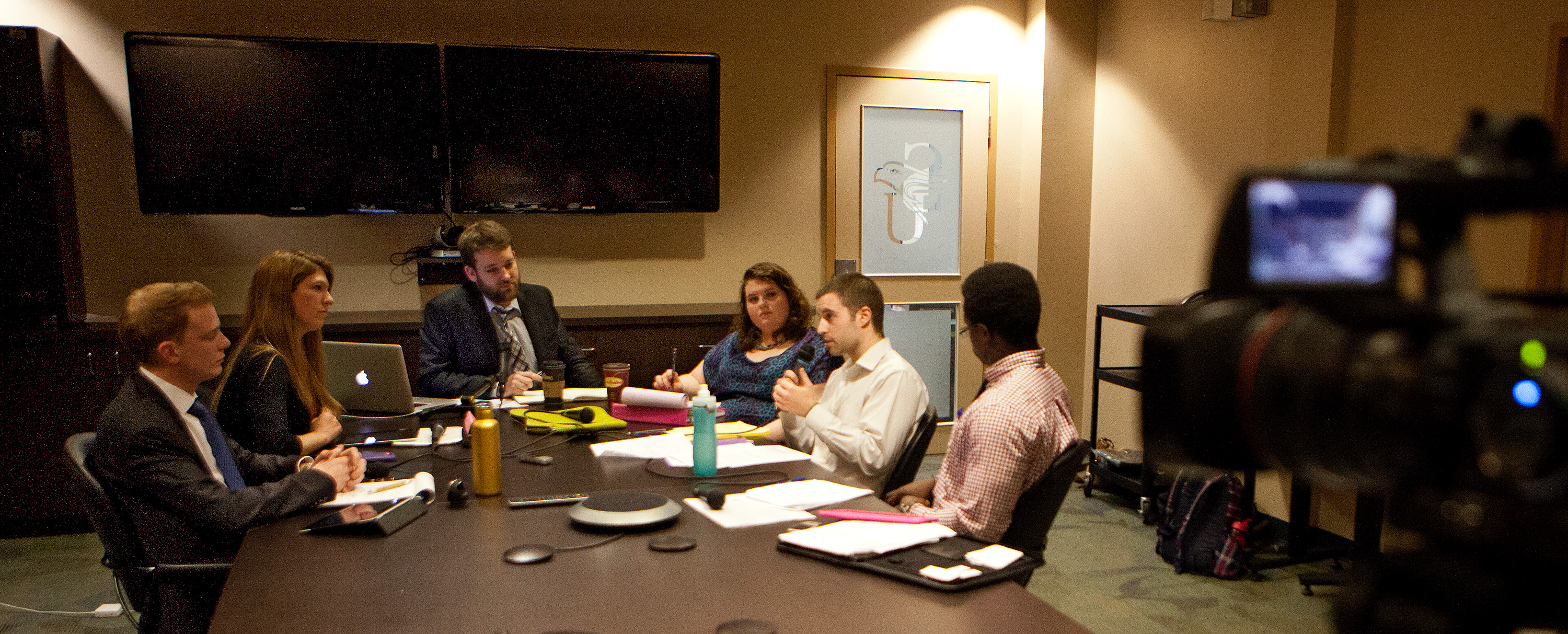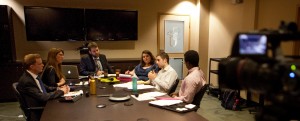Presidential candidates face off in open debate


The Wilfrid Laurier University Students’ Union presidential candidate debate set the five candidates against one another to showcase each of their platforms and ideas. The five candidates — Annie Constantinescu, Caleb Okwubido, Dani Saad, Jennifer Taborowski and Chris Walker — had the opportunity to address issues surrounding the Students’ Union.
Put on by The Cord, the debate featured various questions aimed at addressing the concerns fostered around the candidates’ platforms, as well as additional questions from students.
The main themes that evolved from the two hour debate included study space, student mental health, communication and transparency. All five candidates remained true to their platforms and addressed the issues with what they believed was the most valuable solution.
When asked by Bryn Ossington, the moderator of the debate and executive director of Wilfrid Laurier University Student Publications (WLUSP), to name one thing from another’s candidate’s platform that you completely disagree with, Chris Walker and Annie Constantinescu were the two candidates who received the most criticism in regards to their platforms from the other candidates.
Walker was criticized for being “misleading” in regards to his promise of reducing textbook prices.
“There is no way that textbooks are going to be 50 per cent cheaper,” argued Dani Saad in regards to Walker’s platform.
Walker emphasized that he was involved in lowing the price of coursepacks by 50 per cent last year, and he was not directly promising the decrease of textbook prices, but hoping to accomplish the same drop as coursepacks, and he aims to “encourage faculty to move from expensive textbooks to cheaper coursepacks.”
Jennifer Taborowski also alluded to the belief that Walker’s textbook initiative was misleading, and that “the role of the president doesn’t have much control over that.”
In response, Walker argued that he was “a little shocked that none of the other candidates have incorporated student finances in their platform.”
Furthermore, Constantinescu was questioned on the realistic success of the mobile app she plans on pursuing if elected in hopes of better aiding students in regards to information from campus.
She acknowledged Walker’s statement that past app attempts have not been successful, but she argued that the reasoning behind that was because the “amazing resources” the campus has, such as educated computer science students, were not being utilized.
Mental health was raised at the beginning of the debate and aroused all five candidates in regards to their stance on its importance on campus, and how possible it is to reduce the stress of students by using the available resources, as well as —as pointed out by Walker but rebutted by the fellow candidates — the idea of training on campus staff to be better prepared.
“I really like the optimism with this idea, but I don’t think it’s going to be as easy as it seems,” Saad argued.
Caleb Okwubido addressed the idea that the prevention of mental health was a “long term process, not a short term one,” counteracting Walker’s statement that short terms goals were important.
When asked what their view on mandatory membership in student associations at Laurier and more generally in Canada, the candidates all agreed that mandatory memberships were necessary to educate the students.
“In order to be accountable, we have to be transparent,” Saad argued. “If students don’t know what’s happening, they can’t decide whether they agree or disagree and then they can’t dictate whether we are going to be accountable or not.”
All candidates expressed following the debate that it affirmed each of their platforms at the same time allowing them to respectfully debate each other’s points, as well as agree on many similar issues.
Walker expressed that he was not surprised that he came under fire, but stated that he “worked really hard to put together a platform that I believe in.”
Okwubido stated that the debate gave him motivation, telling him that it was possible for him to succeed, “it told me that, ‘yeah, I could do this.’”
Constantinescu was “impressed by the caliber that all the candidates were bringing” and agreed that the points that were brought up were definitely issues that students were concerned about.
Saad expressed that it was a civil debate, “you can tell we are all passionate about the issues, we all talk about a lot of the same things but come at them in really unique ways, which I think is great.”
Taborowski believed that the debate demonstrated the issues that were at hand and really “gave students something to think about.”
The final official event of the WLUSU presidential campaign will be the open forum on the Brantford campus today. Voting opens on Monday.



